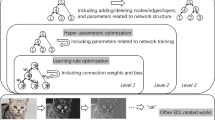Abstract
The ability of evolutionary processes to innovate and scale up over long periods of time, observed in nature, remains a central mystery in evolutionary biology, and a challenge for algorithm designers to emulate and explain in evolutionary computation (EC). The Major Transitions in Evolution is a compelling theory that explains evolvability through a multi-scale process whereby individuality (and hence selection and variation) is continually revised by the formation of associations between formerly independent entities, a process still not fully explored in EC. Deep Optimisation (DO) is a new type of model-building optimization algorithm (MBOA) that exploits deep learning methods to enable multi-scale optimization. DO uses an autoencoder model to induce a multi-level representation of solutions, capturing the relationships between the lower-level units that contribute to the quality of a solution. Variation and selection are then performed within the induced representations, causing model-informed changes to multiple solution variables simultaneously. Here, we first show that DO has impressive performance compared with other leading MBOAs (and other rival methods) on multiple knapsack problems, a standard combinatorial optimization problem of general interest. Going deeper, we then carry out a detailed investigation to understand the differences between DO and other MBOAs, identifying key problem characteristics where other MBOAs are afflicted by exponential running times, and DO is not. This study serves to concretize our understanding of the Major Transitions theory, and why that leads to evolvability, and also provides a strong motivation for further investigation of deep learning methods in optimization.
Access this chapter
Tax calculation will be finalised at checkout
Purchases are for personal use only
Similar content being viewed by others
References
Bello, I., Pham, H., Le, Q.V., Norouzi, M., Bengio, S.: Neural combinatorial optimization with reinforcement learning. arXiv preprint arXiv:1611.09940 (2016)
Boyan, J., Moore, A.W.: Learning evaluation functions to improve optimization by local search. J. Mach. Learn. Res. 1(Nov), 77–112 (2000)
Caldwell, J., Watson, R.A., Thies, C., Knowles, J.D.: Deep optimisation: Solving combinatorial optimisation problems using deep neural networks. arXiv preprint arXiv:1811.00784 (2018)
Chu, P.C., Beasley, J.E.: A genetic algorithm for the multidimensional knapsack problem. J. Heuristics 4(1), 63–86 (1998)
Churchill, A.W., Sigtia, S., Fernando, C.: A denoising autoencoder that guides stochastic search. arXiv preprint arXiv:1404.1614 (2014)
Hansen, P., Mladenović, N., Pérez, J.A.M.: Variable neighbourhood search: methods and applications. Ann. Oper. Res. 175(1), 367–407 (2010)
Hopfield, J.J., Tank, D.W.: “neural” computation of decisions in optimization problems. Biol. Cybern. 52(3), 141–152 (1985)
Horn, J., Goldberg, D.E., Deb, K.: Long path problems. In: Davidor, Y., Schwefel, H.-P., Männer, R. (eds.) PPSN 1994. LNCS, vol. 866, pp. 149–158. Springer, Heidelberg (1994). https://doi.org/10.1007/3-540-58484-6_259
Khalil, E., Dai, H., Zhang, Y., Dilkina, B., Song, L.: Learning combinatorial optimization algorithms over graphs. In: Advances in Neural Information Processing Systems, pp. 6348–6358 (2017)
Lombardi, M., Milano, M., Bartolini, A.: Empirical decision model learning. Artif. Intell. 244, 343–367 (2017)
Martins, J.P., Delbem, A.C.: Pairwise independence and its impact on estimation of distribution algorithms. Swarm Evol. Comput. 27, 80–96 (2016)
Martins, J.P., Fonseca, C.M., Delbem, A.C.: On the performance of linkage-tree genetic algorithms for the multidimensional knapsack problem. Neurocomputing 146, 17–29 (2014)
Martins, J.P., Neto, C.B., Crocomo, M.K., Vittori, K., Delbem, A.C.: A comparison of linkage-learning-based genetic algorithms in multidimensional knapsack problems. In: 2013 IEEE Congress on Evolutionary Computation, pp. 502–509. IEEE (2013)
Mazyavkina, N., Sviridov, S., Ivanov, S., Burnaev, E.: Reinforcement learning for combinatorial optimization: A survey. arXiv preprint arXiv:2003.03600 (2020)
Pelikan, M., Goldberg, D.E.: Hierarchical bayesian optimization algorithm. In: Pelikan, M., Sastry, K., CantúPaz, E. (eds.) Scalable Optimization via Probabilistic Modeling. Studies in Computational Intelligence, vol. 33, pp. 63–90. Springer, Berlin (2006). https://doi.org/10.1007/978-3-540-34954-9_4
Pelikan, M., Goldberg, D.E., Tsutsui, S.: Hierarchical bayesian optimization algorithm: toward a new generation of evolutionary algorithms. In: SICE 2003 Annual Conference (IEEE Cat. No. 03TH8734), vol. 3, pp. 2738–2743. IEEE (2003)
Probst, M.: Denoising autoencoders for fast combinatorial black box optimization (2015)
Santana, R.: Gray-box optimization and factorized distribution algorithms: where two worlds collide (2017)
Smith, J.M., Szathmáry, E.: The Major Transitions in Evolution. Oxford University Press, Oxford (1997)
Thierens, D., Bosman, P.A.: Hierarchical problem solving with the linkage tree genetic algorithm. In: Proceedings of the 15th Annual Conference on Genetic and Evolutionary Computation, pp. 877–884 (2013)
Volpato, R., Song, G.: Active learning to optimise time-expensive algorithm selection (2019)
Vu, K.K., D’Ambrosio, C., Hamadi, Y., Liberti, L.: Surrogate-based methods for black-box optimization. Int. Trans. Oper. Res. 24(3), 393–424 (2017)
Wang, S.M., Wu, J.W., Chen, W.M., Yu, T.L.: Design of test problems for discrete estimation of distribution algorithms. In: Proceedings of the 15th Annual Conference on Genetic and Evolutionary Computation, pp. 407–414 (2013)
Watson, R.A., Hornby, G.S., Pollack, J.B.: Modeling building-block interdependency. In: Eiben, A.E., Bäck, T., Schoenauer, M., Schwefel, H.-P. (eds.) PPSN 1998. LNCS, vol. 1498, pp. 97–106. Springer, Heidelberg (1998). https://doi.org/10.1007/BFb0056853
Watson, R.A., Szathmáry, E.: How can evolution learn? Trends Ecol. Evol. 31(2), 147–157 (2016)
West, S.A., Fisher, R.M., Gardner, A., Kiers, E.T.: Major evolutionary transitions in individuality. Proc. Nat. Acad. Sci. 112(33), 10112–10119 (2015)
Yu, T.L., Sastry, K., Goldberg, D.E.: Linkage learning, overlapping building blocks, and systematic strategy for scalable recombination. In: Proceedings of the 7th Annual Conference on Genetic and Evolutionary Computation, pp. 1217–1224. GECCO 2005 (2005)
Zhang, W., Dietterich, T.G.: Solving combinatorial optimization tasks by reinforcement learning: a general methodology applied to resource-constrained scheduling. J.of Artif. Intell. Res. 1, 1–38 (2000)
Acknowledgements
We acknowledge financial support from the EPSRC Centre for Doctoral Training in Next Generation Computational Modelling grant EP/L015382/1.
Author information
Authors and Affiliations
Corresponding author
Editor information
Editors and Affiliations
Rights and permissions
Copyright information
© 2021 Springer Nature Switzerland AG
About this paper
Cite this paper
Caldwell, J., Knowles, J., Thies, C., Kubacki, F., Watson, R. (2021). Deep Optimisation: Multi-scale Evolution by Inducing and Searching in Deep Representations. In: Castillo, P.A., Jiménez Laredo, J.L. (eds) Applications of Evolutionary Computation. EvoApplications 2021. Lecture Notes in Computer Science(), vol 12694. Springer, Cham. https://doi.org/10.1007/978-3-030-72699-7_32
Download citation
DOI: https://doi.org/10.1007/978-3-030-72699-7_32
Published:
Publisher Name: Springer, Cham
Print ISBN: 978-3-030-72698-0
Online ISBN: 978-3-030-72699-7
eBook Packages: Computer ScienceComputer Science (R0)




